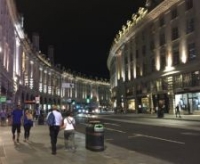The latest data from New West End Company, which represents 600 businesses across Oxford Street, Bond Street, Regent Street and Mayfair, reveals that in the first full month of non-essential retail reopening, London's West End welcomed 5.1 million visitors since June 15th down 73% year on year for this same period. While footfall in London's West End has been rising since the reopening of non-essential retail; increasing by 5% since retail reopened, London is still faring worse than the rest of the UK. Retail expert Springboard's latest figures reveal that footfall levels in UK high streets are down 57.2% compared with June 2019; 19% higher than central London.
What this data shows, is that city centres, significantly central London, are being held back by a series of restrictions, including uncertainty surrounding returning to work and the use of public transport. Clarity from the Government, in line with local authorities is needed to instil consumer confidence over the coming weeks and ensure that retail and hospitality businesses run viably throughout the summer.
Within London's West End, where average footfall is 19% lower than the national average, without further Government action, the lack of domestic and international tourists and office workers could lead to a £5 billion loss in sales, putting over 50,000 jobs at risk.
Jace Tyrrell, Chief Executive at New West End Company commented: _"the protection of retail and leisure jobs is our utmost priority, and while the Government's measures take the first step in supporting the West End's recovery, without consumer confidence to travel and visit; this situation is highly precarious with 50,000 jobs are at risk. With no international visitors and mixed messaging surrounding the safety of returning to work and using public transport, we urgently seek clarity of Government messaging for our businesses to survive. With the UK-EU trade deal deadline also looming, we need to ensure that destinations that rely on international visitors, which have been so hard hit by the pandemic, are accounted for in longer-term recovery plans including levelling up on tax-free shopping with the EU."
Diane Wehrle, Insights Director at Springboard commented: _"Despite the reopening of retail in England on 15th June footfall across UK high streets remains 57.2% lower than last year. Regional cities, the largest high street locations in the UK have been even harder hit with footfall still 70.4% lower than in 2019. And in Central London the economic hub of the UK, the picture is even worse, with footfall languishing at 76.2% lower than last year only improving by around a quarter from a low of 92.4% over the first four weeks of lock down."
Looking beyond the Summer months, long term measures are needed to boost businesses as and when international visitors return to our city centres. Making a low-cost and effective change to the tax-free shopping system will generate more revenue and encourage more international shoppers to spend in the UK. 70% of all international visitors to the UK are from EU member states but they are currently excluded from its tax-free shopping scheme. Including them post-Brexit could add up to £1.4 billion in retail sales annually and give an overall benefit of £2.1 billion to the UK economy.
Ian Earnshaw, Commercial Director at Mulberry commented: "_With the decline in sales and footfall bought on by Covid-19, the retail and leisure sector urgently need new measures to ensure that businesses in London and the wider UK can operate on a level playing field as they recover from the implications of the pandemic. The tax-free shopping reform is a low-cost and effective change that will enable UK retail businesses and destinations to regain a competitive advantage against other retail centres and compete on the global stage."






